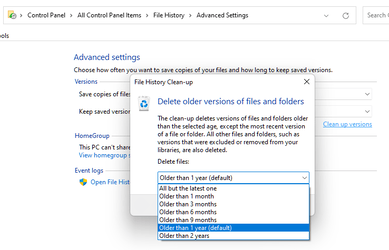- Local time
- 6:24 PM
- Posts
- 1,992
- OS
- Windows 10 Pro
I like File History, it makes copies of your files every hour in one of the default settings, so the most you lose is 1 hour worth of work.
The default settings for 'Keep saved versions' is 'Forever'. Really? I don't quite trust that and while keeping the 'Forever' default setting, I toss the File History folder every month or every other month or so, and start anew.
How about you?
The default settings for 'Keep saved versions' is 'Forever'. Really? I don't quite trust that and while keeping the 'Forever' default setting, I toss the File History folder every month or every other month or so, and start anew.
How about you?
My Computer
System One
-
- OS
- Windows 10 Pro


















